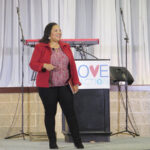By Tadd Ruetenik
Guest Column

Catemaco, Mexico is located on a large lake that surrounds a small island inhabited only by monkeys. It is south of the city of Veracruz, where the Spaniards first arrived — and with the lamentable violence of conquest — where a new consciousness was formed.
Mexican philosopher José Vasconcelos would later refer to Mexico as the land where a cosmic race would develop. He argued that Mexicans should think of their combined Spanish and indigenous blood as an asset, especially in defense against the encroachment of the Anglo-Saxons — that is, of people from the north who look like me.
However, Catemaco has a divided consciousness. On the one hand is the presence of the Catholic Church; on the other is the presence of the famous “brujos,” that is, male witches. The Catholic Church has traditionally opposed occultism out of an understandable concern for idolatry among its followers. However, the city cannot deny the economic impact of tourists drawn by the rituals of divination and spiritual cleansing.
The Catholics and the brujos seem to be battling for spiritual ownership of Catemaco. In March, I, an Anglo-Saxon Catholic, visited to experience what it feels like to be in a spiritual battle in this otherwise safe and friendly pueblo.
As I arrived, the Basilica de Nuestra Señora del Carmen invited me in with its mere presence. It has large entrances on three sides and the tile floor below is integrated into the surrounding streets. The first thing I did was awkwardly toe-drop the kneeler, creating a sound as loud as a gunshot. No one seemed to be bothered. I would later notice the overall loudness of the activity inside. I remember going to heavy metal concerts in my youth, where you could hear the din and feel the pulse of the music. Here at the basilica was a man on electric guitar and a woman with a microphone, playing among a group of swaying, hand-raising worshippers. A heavily reverberated litany of “Ven Espiritu Santu” was all I could discern.
Oddly, this made me reflect on violence. Earlier, the church bell had startled me with a peal that was a little louder than the town needed. Upon the raising of the host at Mass, the altar server aggressively chimed a bell in one hand with the striker he held in the other. One of the most prominent brujos in Catemaco was located about 200 meters away. I imagined that the clangs were directed his way.
Earlier, I had walked by this brujo’s office and looked into an open walkway, leading into the darkness of black walls and ceiling. I walked past, taking a picture of the cellophane-suffocated Santa Muerte figures they were selling. The previous day, a man had directed me to an ordinary house in which the brujo recommended the fuerte rather than the sencillo cleansing. I noticed the pentacle tiled into the floor in front of his altar but I was not immediately scared away. I would sometimes see these things associated with heavy-metal bands but dismiss them as irrelevant to what I liked in the music.
What did scare me away was the price: 2,000 pesos. I don’t like negotiating with people, especially when speaking in my second language. Figuring U.S. $120 was too much to pay for something I don’t really believe in, I declined. The brujo was nice about it as I decided to leave, ignoring my usual dread of disappointing people. I am glad I made the decision to leave. I am curious, but I am also prudent enough to know when I should be curious at a distance.
On my final night, I came across a group of about 75 people sitting in plastic chairs around a house emitting incense smoke as if on fire. A woman who had spoken encouragement to me at the basilica offered me a seat. She explained that the gathering was a prayer service for someone who died 40 days ago. I felt comfortable, even though I was the only foreigner there and I didn’t know the person who died.
Perhaps the brujos are partially right in trying to claim some spiritual territory for themselves. I do not lament the landing of Catholics in Veracruz centuries ago. I do not feel right, however, in fighting in the spiritual battle for the city. I don’t know if the brujos would even want me on their side. But I know that as long as the Mexico Catholics will have me, I will somehow find my way to them.
(Tadd Ruetenik is a professor of philosophy at St. Ambrose University in Davenport.)











